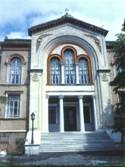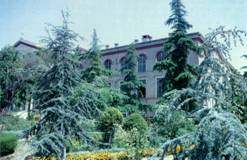Holy Theological School of Chalki
Απὸ Γερμανὸν τὸν Δ´ εἰς Βαρθολομαῖον τὸν Α´ (1844-2002)
 |
![]()
The Holy Theological School of Halki is located at the top of a hill called the Hill of Hope, on the island of Halki, one of the Princes' islands. It is approximately one hour by boat from the shore of Constantinople. On the grounds of the School is the monastery of the Holy Trinity which was founded during the Byzantine period, though the exact date of its establishment is unknown. The reestablishment and reconstitution of the monastery are associated with the Ecumenical Patriarchs Photius I the Great, Metrophanes III, and Germanos IV. Germanos IV (1872-1845) visited the monastery in 1842 and saw the School's reconstruction and reconstitution which was approved by the Turkish authorities. On the 1st of October 1844, with a special ceremony to mark the occasion, the operation of both the Holy Monastery and the Theological School were resumed.
The building which originally housed the Monastery was a wooden structure. It comprised rooms for the professors, class rooms, an infirmary, administrative offices and Patriarchal quarters. The library of the School was housed in a nearby two-floor stone building. Unfortunately, on June 28th, 1894, an earthquake completely destroyed all the facilities except for the church. This led to a halt in the School's operation.
The Holy Monastery and the Theological School of Halki owe its current form to the contribution made by the benefactor Pavlos Skilitsis Stefanovik. He charged the architect Periklis Fotiadis with the design and construction of the new facilities which took the form of the Greek letter Π. The School's complex is composed of a basement, a ground floor and two stories. The inauguration took place on October 6th 1896, after which the function of the School was resumed. During the 50s modifications were made to the complex in order to satisfy new needs and requirements. New contemporary fixtures for bathrooms, central heating, kitchen, and cold storage were installed; the entire roof was repaired, the infirmary and the administrative offices were reorganized. During this same period numerous repairs were made to the Monastery's church.
The School's buildings are surrounded by gardens whose aesthetic design and creation were overseen by Metropolitan Dorotheos of the Princes' Islands. Behind the altar of the Monastery's church and in a special location just beyond the garden are located the graves of Patriarchs, bishops and teachers of the School.
The Holy Theological School of Halki was established in order to meet the educational needs of the Church of Constantinople and of Orthodoxy in general. Other contributing causes included the renaissance in learning which occured during the 19th century; the need for ecclesiastical and theological instruction of the orthodox clergy; the orderly and systematic cultivation of theological knowledge; the need to confront western ideologies with an anti-Christian bias, such as materialism and sociophilosophical systems with rigorous argumentation; and finally the need to confront the proselitization efforts which were being conducted by western Christian denominations at the expense of Orthodoxy.
The history of the Holy Theological School of Halki, from its establishment in 1844 until today, can be split into five distinct periods: From 1844 to 1899, the School had seven grades: four high school level and three theological grades. From 1899 to 1923, the high school division was dissolved and the School functioned as an Academy with five grades. From 1923 to 1951, the old seven grade system was restored. From 1951 to 1971, the School had seven classes: three at the high school level and four theological grades. In 1971 the School was closed according to a law that was promulgated by the Turkish goverment which prohibited the operation of private institutions of higher education. Thus, since 1971, despite occasional promises by the Turkish authorities, the School has remained closed. However, Orthodox faithful and friends of Orthodoxy visit and congregate at the School, and recently, under the initiative of the Ecumenical Patriarch Bartholomew, international ecological conferences and seminars with international patricipation have been hosted at the School.
The Holy Theological School of Halki operated under the various educational laws that were promulgated in 1845, 1853, 1857, 1867, 1874, 1898, 1903, and 1951. The law of 1903 provided the legal framework under which the modern day School operated. This law underwent modification in 1923 (and in subsequent years), in accordance with the Regulations of the Ministry of Education of the Republic of Turkey regarding Minority schools in Middle Level Education. The 1951 Code was ratified by the Turkish Republic. Regarding the regulation the School's internal operations, such as matters pertaining to conduct, discipline, and administration, there exist special internal rules that are drafted by the School itself.
The Theological School of Halki is an institution of the Ecumenical Patriarchate and therefore the Ecumenical Patriarch and the Holy Synod of the Ecumenical Throne that surrounds the Patriarch, are its immediate patron, regulator, and spiritual guide. Matters pertaining to the School are handled by a special committee known as the «Ephors of the Holy Theological School of Halki.» This Committee operates out of a special office located at the Patriarchate and it reports directly to the Holy Synod. Among its responsibilities are the School's budget, staff appointments, student admissions, and more broadly the supervision of the School.
 |
The internal regulation of the School is the responsibility of its Director, who is called the Scholarch. An archimandrite may be appointed to the post of Scholarch but usually, he is either a bishop or an archbishop. He serves as the director of the teaching staff and as the prior of the monastic brotherhood whose members are also the School's students. The Scholarch is assisted by the teaching staff, the Secretary, the superintendent of the student body, the librarian, the secretary of administration are the household manager. The Scholarch is usually appointed from amongst the unmarried clerics of the teaching staff.
Teachers in theology, and more generally most of the clergy and laymen who taught here, were usually graduates of the School who went on to continue their specialized education at orthodox schools or foreign universities. Aside from their teaching responsibilities, professors also serve as members of various synodic committees of the Ecumenical Patriarchate. They participate in various interorthodox and inter-Christian conferences as representatives of the Patriarch and the School, and often they are called upon ti give lectures or public speeches at foreign universities. Professors of the School were: F. Vafeiadis, V. Antoniadis, Ch. Androutsos, V. Stefanidis, I. Evstratiou, P. Komnenos, the Metropolitan of Stavroupolis Maximos, Ioan. Panagiotidis, the Metropolitan of Ephesus Chr. Constantinidis, G. Anastasiadis, Emm. Fotiadis, V. Anagnostopoulos, K. Kallinikos, V. Stavridis, Ar. Passadaios, the Metropolitan of Derka, K. Harisiadis, the Metropolitan of Ilioupolis and Theira Ath. Pappas, and E. Fountopoulos.
According to the School's internal regulations the School maintains an interorthodox regime with a clear Ecumenical character. Because it functions as a monastic brotherhood it only accepts male laymen, clerics or monks. However, during its last phase, and for only a brief, it accepted married males as auditors. Student dress within the School is the mandatory short black cassock. Students are allowed limited outings on designated days but special permission for emergency or special occasions is granted according to circumstance. In cases where the students, upon completion of their studies, choose not to be ordained they are required to compensate the school for expenses incurred.
Generally the students, upon qualifying, join the ranks of the clergy either during their studies or upon graduation. The proportion of ordained is quite high, approaching 80 percent. At the center of student life is orthodox worship and participation in a multitude of church functions. Great weight is givento the teaching of Byzantine music and graduates of the school are distinguished for their knowledge in this area.
The curriculum for the high school grades of the School is similar to that of a classical Lyceum, while the courses of the theological section are similar to those the orthodox theological schools that operate in Greece or other orthodox countries. The lessons usually are of one year duration broken up into two six month semesters. Examinations are given at the end of the semester and, in between, there are various quizzes to check on the students' progress. At the end of the fourth year, students must submit a thesis and after its acceptance they are allowed to take the final examinations for their degree. The degree is awarded in a special ceremony which takes place on the first Sunday of July every year in the School's church in the presence of the Patriarch and accompanying clergy from the Holy Synod.
The School's library, which is considered to be one of the richest in the world in old and rare works, was established in the Byzantine years. Many of the manuscripts date from the period of Theodore Stoudite, Photios the Holy, and Catherine Komnene. The founder of the library was Patriarch Metrophanes III (1565-1572 and 1579-1580) whose contribution predated the establishment of the School. He donated 300 rare manuscripts, many of which are preserved at the Manuscript Wing in the Patriarchical Library. Over the year, book donations and contributions enriched the library's initial holdings. The main donator and contributions enriched the library's initial holding. The main donator has been the Ecumenical Patriarchate to which this library belongs, as a second library-subsidiary to that of the Patriarchate's main library at Phanar.
The purpose and significance of the Holy Theological School of Halki may briefly be summarized as follows: the School operates as a monastic brotherhood in a place of peace and quietude, in a Patriarchical Monastery that is far from the hustle and bustle of the city. The prevailing temper of the School is one of instense academic and ecclesiastical and theological Schools of Alexandria, Antioch, and Constantinople. The School prepares and educates its students for theological studies and the ecclesiastical order. It serves the clerical needs of the Ecumenical Patriarchate as well as other Autonomous Orthodox Churches. The present Ecumenical Patriarch Bartholomew, the entirety of the clergy of the Synod, many noted clerics in Greece and abroad, and a number of university professors are graduates or students of the School of Halki.

